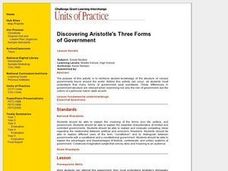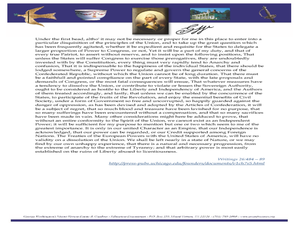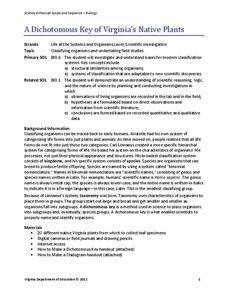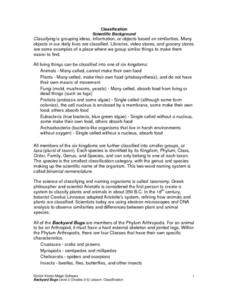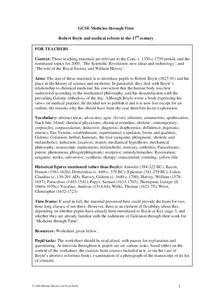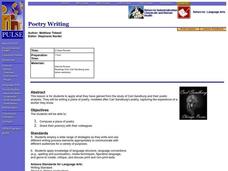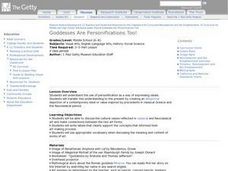Curated OER
Discovering Aristotle's Three Forms
Students, working in small groups, role play different kinds of governments--oligarchy, monarchy, dictatorship, and democratic republic. They portray their form of government in a skit, while other groups guess which kind of government...
Curated OER
Persuasive Writing and Speaking
Rhetorical appeals (pathos, logos, and ethos) are the focus of a series of exercises that asks class members to brainstorm topics for persuasive speeches, groups to craft a persuasive speech about one of the topics, and individuals to...
Curated OER
Cultural Logo Design
Students create a logo design to express their own identity. In this logo design lesson, students list ten words to describe who they are and choose two of them to use in a logo. Students draw images and choose various forms of...
Curated OER
George Washington & the Classics
Students will compare and contrast famous philosophers with George Washington. In this history lesson, students work in small groups to define Classicism, Legalism, Democracy, Republic and Civility, then read some short excerpts so that...
Curated OER
Ancient Atomic Theories
Studdnts research ancient texts and compare ancient Greek atomic theories, as used in the production of silver, to modern theories.
Curated OER
Robert Boyle and the Mechanical Philosophy
Students read and discuss Boyle's Mechanical Philosophy and his rejection of Aristotle's theory of "Forms and Qualities." They answer a given set of questions and discuss these with the class.
Curated OER
Two Views of the Universe
Students build the two models of the universe created by Aristotle and Copernicus. They compare and contrast the two universes. They create hypothesis on how each model functions.
Curated OER
Checkmate: The Play's The Thing
Students investigate the Middle Ages and it's relation to the theater. In this acting lesson, students read Arthurian stories form the Middle Ages and practice using vocabulary words from the Medieval Times. Students write a play set...
Southern Nevada Regional Professional Development Program
Common Core Reading Standards: Understanding Argument
What does your class know about logical fallacies? They can find out quite a bit and practice identifying logical fallacies if you follow the steps and use the resources provided here! After reviewing ethos, pathos, and logos, ask small...
Curated OER
How Tragic!
Learners study and interpret a classical tragedy and role play a character from the play. In this tragedy lesson, students discuss a specific work to discover the form, structure, and characteristics of the genre and interpret the...
Curated OER
Language Arts: The Three Appeals
Students are able to identify and describe the persuasive techniques used in editorial writing. They are able to label persuasive techniques with the logos, pathos, and ethos terminology.
Curated OER
Logos and Commercial Arts
Students identify popular logos and discuss the purpose they serve in advertising. They take a familiar logo and redesign it based on their own experience with the company it represents.
Curated OER
Using Logos and Mission Statements to Communicate Sustainable Forestry Information
Young scholars survey forestry foundations to see how they represent important information into their logos and mission statements. In this forestry lesson plan, students use the information to better understand visual representations...
Virginia Department of Education
A Dichotomous Key of Virginia’s Native Plants
Can your class correctly classify plant species? Individuals explore native plants of the local environment and correctly classify them into their respective categories. They investigate differences in the plants and discuss similarities...
Curated OER
Backyard Bugs
Explore the concept of scientific classification and the similarities and differences between plant and animal species. Your class will participate in hands-on activities by investigating dichotomous keys and classifying their shoes. To...
Michael Hunter and Fiona Kisby
Robert Boyle and Medical Reform in the 17th Century
Introduce pupils to the work of Robert Boyle and his influence on medical practice through a series of informational texts and discussion questions.
Curated OER
Goddesses Are Personifications Too!
Students explore the use of personification as a way of expressing ideals. They transfer this understanding to the present by creating an allegorical depiction of a contemporary ideal or value inspired by precedents in the Neoclassical...
Curated OER
How Tragic!
Tenth graders read and study, in-depth, a specific classical tragedy, in this case, Oedipus. They explore strategies from making meaning out of or interpreting texts, as well as strategies for determining how authors create meaning in...
Curated OER
Mosquito Life Cycles
Students gather mosquito eggs to record the mosquito life cycle using drawings, descriptions, and any other appropriate means. In small groups, they analyze and describe the process of complete metamorphosis. They classify mosquitoes...
Curated OER
Cloudy Days are for Reading and Writing
Students research weather proverbs and determine the scientific validity of 3 weather proverbs. They write an essay presenting their reasoning. They interview elderly people to graph the most frequently heard proverbs and theorize...
Curated OER
Poetic Analysis
Young scholars write a poetic analysis on a poem by Carl Sandburg. They take their previous knowledge of poetic devices and apply them to a piece of writing that displays their knowledge on a specific poem. They explain what they know...
Curated OER
Poetry Writing
Students compose a piece of poetry modeled after the poetry of Carl Sandburg and share their poem(s) with their colleagues. They use a cluster diagram to organize their thoughts and brainstorm their ideas.
Curated OER
Coin Content
Students calculate ancient Greek coin values as compared to their weight, equivalence in grain, and determine their worth today. They explain how to calculate fractions of a given weight and how to use decimal numbers.
Curated OER
Goddesses are Personifications Too!
Students analyze the use of personification in classical Greek art and the Neoclassical period. In this Neoclassical art instructional activity, students discuss the cultural values reflected in classical and Neoclassical....


